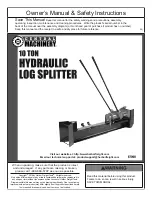
Maintenance & Adjustments
6
15
WARNING!
Do not make any adjustments without
first stopping the engine, disconnecting the spark
plug wire and grounding it against the engine.
Always wear safety glasses during operation or
while performing any adjustments or repairs.
Engine
Refer to the Engine Operator’s manual packed with your log
splitter for all engine maintenance.
NOTE:
When draining oil from the engine on this log splitter,
shield the hoses from any oil that may run down the frame and
drip onto the hoses. Thoroughly wipe any residual oil off the log
splitter and hoses after completing service.
Tire Pressure
The max recommended operating pressure is 30 psi. Do
not, under any circumstances, exceed the manufacturer’s
recommended psi. Maintain equal pressure on all tires.
WARNING!
Excessive pressure when seating beads
may cause the tire/rim assembly to burst with force
sufficient to cause serious injury. Refer to the
sidewall of the tire for the recommended pressure.
Hose Clamps
Check the clamps on the return hose before each use and check
the clamps on the suction hose once a season.
Hydraulic Filter
Change the hydraulic filter every 50 hours of operation. Use only
a 10 micron hydraulic filter. Order part number 723-0405.
Flexible Pump Coupler
The flexible pump coupler is a nylon “spider” insert, located
between the pump and the engine shaft. Over time, the coupler
will harden and deteriorate. If you detect vibration or noise
coming from the area between the engine and the pump contact
an authorized service dealer. If the coupler fails completely, you
will experience a loss of hydraulic power.
Hydraulic Fluid
Check the hydraulic fluid level in the log splitter reservoir
tank before each use. Maintain the fluid level within the range
specified on the dipstick at all times.
Change the hydraulic fluid in the reservoir every 100 hours of
operation. The filter should also be changed with each hydraulic
fluid change. Follow the steps below:
1.
Place a suitable oil collection container under the tank.
2.
Disconnect the suction hose from the bottom of the
reservoir tank.
3.
Carefully unthread the inlet filter and clean it with
penetrating oil. See Figure 6-1.
Inlet Filter
Suction Hose
Figure 6-1
4.
Allow the fluid to drain into a suitable container.
NOTE:
The reservoir tank has a capacity of 3 gallons and
the entire hydraulic system has a capacity of approximately
4.7 gallons.
5.
Reinstall the filter inlet screen and suction hose. Tighten
the hose clamp.
6.
Check the fluid level using the dipstick. Do not overfill.
NOTE:
Approved fluids include Shell Tellus® S2 M
32 Hydraulic Fluid, Dexron® III / Mercon® automatic
transmission fluid, Pro-Select™ AW-32 Hydraulic Oil
or 10WAW-ISO viscosity grade 32 hydraulic oil. It is
recommended that fluids not be mixed.
7.
Replace the vented dipstick securely, tightening it until the
top of the threads are flush with top of the pipe.
8.
Disconnect the spark plug and prime the pump by pulling
the recoil starter as far as it will go. Repeat approximately
10 times.
9.
Reconnect the spark plug wire and start the engine
following the instructions in the Operation Section.
10.
Use the control handle to engage the wedge to the farthest
extended position. Then retract the wedge.









































